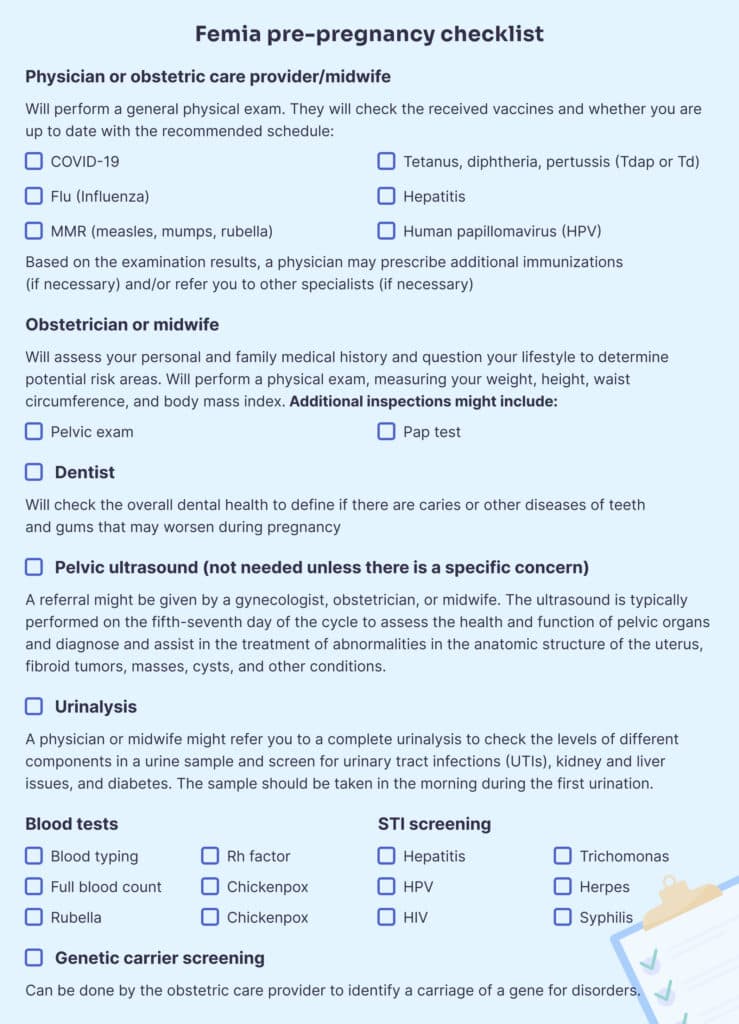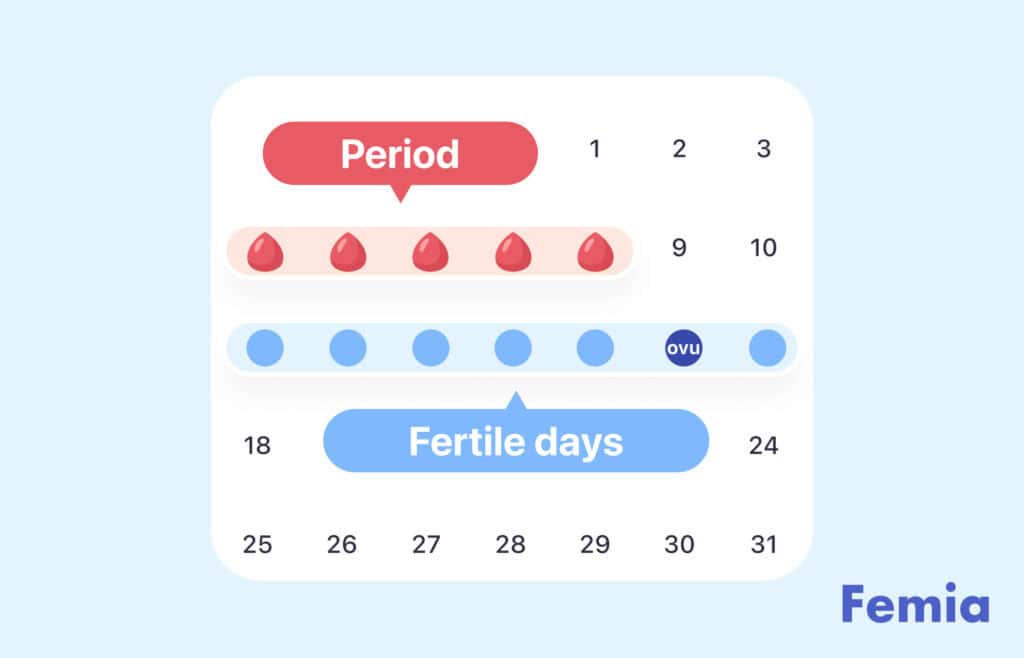Femia > Health Library > Getting Pregnant > Planning pregnancy > Ultimate pre-pregnancy checklist: Essential steps to take before having a baby
Ultimate pre-pregnancy checklist: Essential steps to take before having a baby

- Updated Feb 11, 2025
- Published
CRAFTED BY HUMAN
Crafted by human At Femia, we provide accurate and up-to-date information at every stage of your journey, from trying to conceive, pregnancy and postnatal support. All content is created by a real person based on in-depth research and own professional experience. Femia ensures that you will receive expert advice, strict accuracy and a personalized approach from our authors/medical experts. Learn more about our editorial policy.
FACT CHECKED
Fact checked At Femia Health, we maintain the highest standards of editorial excellence in delivering content focused on helping you conceive, guiding you through pregnancy, and supporting you postpartum. Explore our content review principles to learn how we ensure the accuracy and quality of our health and lifestyle tips for every stage of your journey.
Preparing for pregnancy involves thorough preconception checkups, genetic carrier screening, and lifestyle adjustments like taking folic acid, tracking your menstrual cycle, and quitting smoking.
Going through all steps of preparation might take a bit of effort, but growing a human being is life changing and at the end of the day, you will likely be glad to be educated and prepared for what to expect during your pregnancy.
Pregnancy preparation is an empowering process that enables you to gain solid knowledge and understanding of your future pregnancy that can help you make the best decisions both for yourself and for your baby. And it’s good to begin it before conception to prepare yourself best.
We will cover different stages of pregnancy preparation and share some handy advice on recommended testing, preconception checkups, and other important considerations that you can follow or decline based on your unique situation and a consultation with your healthcare practitioner.
👉Find out more: Best age to get pregnant with PCOS

Pre-pregnancy testing
1. Genetic carrier screening
Genetic carrier screening detects the carriage of genes for disorders like spinal muscular atrophy, cystic fibrosis, or fragile X syndrome.
It is recommended for all pregnant (or planning-to-be-pregnant) women to take this screening. Many of these disorders result from recessive genes, so a primary concern is that even if neither you nor your partner experience any tangible symptoms, you may possess and pass down the gene without knowing it.
👉Find out more: How to boost fertility naturally
Femia offers the most accurate tool for determining ovulation and fertile days
2. Blood tests
Pre-pregnancy blood tests are essential for identifying potential risks and ensuring a healthy pregnancy. The first test to consider is blood typing, which determines your blood group and Rh factor. Knowing both parents’ blood types is crucial, as it can predict possible complications, such as Rh incompatibility. This occurs when the mother is Rh-negative and the father is Rh-positive, potentially leading to immune system issues in future pregnancies. While it may not cause problems in a first pregnancy, Rh incompatibility can affect subsequent pregnancies, making it important to understand both partners’ Rh status.
Additionally, a complete blood count (CBC) can give insight into overall health by measuring key blood components like hemoglobin, which is vital for delivering oxygen to the baby. Other tests, such as thyroid function and diabetes screenings, may be recommended based on individual health factors. It’s also important to check immunity to diseases like rubella and chickenpox, which can pose risks during pregnancy.
3. STI screening
Sexually transmitted infections (STIs) come in different types, including:
It can be a good idea to include STI screening in your preconception testing. You may consider this opportunity due to two primary reasons:
- STIs may impact both female and male fertility, complicating and lengthening the conception process.
- Some STIs can be transmitted to the fetus and result in different health challenges.
By testing for STIs early, you can ensure that you are on the safe side or treat infections before the pregnancy.
👉Find out more: How to boost fertility in your 30s
@femia.fertility Are you trying to conceive naturally? Try this preconception care plan to prepare your body for pregnancy! #preconceptionnutrition #preconceptioncare #prenatalnutrition #fertilitytiktok #ttcbaby ♬ snowfall - Øneheart & reidenshi
Preconception checkup
1. Choosing a healthcare provider
As step one, you will want to find and plan a checkup with a healthcare specialist. We recommend you to consider the following care providers:
- Family doctor. A doctor who specializes in taking care of pregnant women and delivering babies.
- Midwife. A specialist who hold the education and training needed to assist women in primary, prenatal, and obstetric care. Midwives typically work together with obstetricians and gynecologists, as they have a different skill set from physicians.
Whichever specialist you select, bear in mind two crucial points: 1) it should be a professional you trust and feel comfortable with to minimize stress; and 2) it can be a good idea to consider getting your checkup with a provider who will take care of you during pregnancy later.

2. Medical history review
During your preconception appointment, a thorough medical history review is one of the first steps. This includes personal and family medical histories, which help healthcare providers assess risks and guide reproductive decisions.
Your provider may also ask about travel to areas with diseases like Zika, exposure to Toxoplasmosis (commonly linked to cat litter), and mental health concerns. They might screen for issues such as trauma or intimate partner violence to ensure a comprehensive evaluation.
3. Current health assessment
During a preconception checkup, a healthcare provider should also assess your current health condition. This can involve the following components:
- Physical exam. A general physical examination might include a checkup of your weight, blood pressure, skin, lungs, heart, etc.
- Pelvic exam. A healthcare provider might perform an examination of your pelvic organs (e.g. vagina, cervix, uterus, etc.) to ensure they are healthy.
- Cervical screening. This screening may include checking up for viral DNA or abnormal cells to identify risk of cervical cancer and check the overall health of the cervix.
Additionally, your healthcare provider will likely collect additional information about your work and life that might affect conception or pregnancy. They may ask you about the birth control methods you are using, your smoking or drinking habits, medications you take, and whether you get exposed to any harmful chemicals at home or work.
Based on your personal and family medical history, your specialist may also recommend that you see a genetic counselor.
👉Find out more: Pelvic floor massage 101: How to relieve pain and improve function
4. Contraception review
Before trying to conceive, it’s important to review your current contraceptive method with your healthcare provider. Depending on the type, you may need time for your body to regulate its natural cycle after discontinuation. For example, hormonal contraceptives like birth control pills may delay ovulation for a few months, while barrier methods like condoms can be stopped immediately without delay. Your provider can guide you on the best timeline for conception based on your contraception history.
5. Vaccinations
During a checkup, healthcare providers typically assess your vaccination history to ensure that you have immunity against diseases that might affect your pregnancy.
A specialist will check if you are up to date with the following recommended vaccines:
- COVID-19
- Flu (Influenza)
- MMR (measles, mumps, rubella)
- Tetanus, diphtheria, pertussis (Tdap or Td)
- Hepatitis
- Human papillomavirus (HPV)
After examining the received vaccines, a specialist may recommend that you get additional immunizations according to the recommended schedule.
6. Dental checkup
A dental checkup is an essential part of pre-pregnancy care. Oral health can impact pregnancy, as conditions like gum disease and untreated cavities are linked to complications such as preterm birth and low birth weight. Pregnancy hormones can also make gums more sensitive, increasing the risk of inflammation and bleeding. Before conceiving, it’s a good idea to have a dental exam, address any issues, and ensure your oral health is in top shape. Maintaining good dental hygiene during pregnancy can support both maternal and baby health.
Things to do before having a baby
1. Folic acid supplementation
Folic acid is a key supplement for women planning to get pregnant. The body converts folic acid into folate, which is essential for:
- DNA replication
- Amino acid synthesis
- Vitamin metabolism
- Fetal growth and development
Benefits of folic acid supplementation before conception include:
- Lower risk of neural tube defects (NTDs)
- Potential protection against congenital heart defects and other anomalies
- Reduced risk of preterm birth
Since the critical period for folate is during organ formation (3-8 weeks), it’s recommended to start taking folic acid when planning pregnancy, as conception timing can be uncertain.

2. Tracking your menstrual cycle
Different stages of your menstrual cycle have different effects on your fertility. The highest likelihood of conceiving is during the ovulation period.
The variability of your menstrual cycle also matters. Studies reveal that women with high variability tend to have a 51% lower pregnancy probability per cycle.
Due to these reasons, your menstrual cycle, its stages, and variability are important things to consider before having a baby. By tracking your cycle, you can enhance the likelihood of conception by planning intercourse during your ovulation period.

Femia offers the most accurate tool for determining ovulation and fertile days
3. Healthy diet
Eating a nutrient-rich fertility diet is essential for preparing your body for pregnancy. Focus on whole foods like fruits, vegetables, whole grains, and lean proteins to support fertility and overall health. Incorporating foods high in folate, iron, and calcium is especially important for your baby’s early development.
4. Quit smoking
Smoking is linked to fertility issues and pregnancy complications. Quitting before conception helps protect both your health and your baby’s development.
5. Abstain from Alcohol
Drinking alcohol during pregnancy can lead to fetal alcohol spectrum disorders (FASD). To reduce risks, it’s best to stop drinking when planning a pregnancy.
6. Limit caffeine
High caffeine intake has been associated with miscarriage and preterm birth. It’s recommended to limit consumption to 200 mg or less per day.
7. Stay physically active
Regular exercise boosts fertility and overall health. Joining a gym, sports team, or trying prenatal yoga and fitness classes can help maintain fitness and reduce stress before conception.
8. Financial planning
According to the latest figures, the average cost of pregnancy, childbirth, and post-partum care in the US is $18,865. There are also many additional expenses after childbirth, which is why financial planning should be among the top things to do before having a baby.
To prepare well, consider auditing your current income, emergency fund, and other assets to define a budget for medical expenses, baby supplies, and other things. Consider the potential loss of income due to maternity leave and its impact on your household. The more details you plan ahead, the easier it should be to overcome the potential financial challenges.
9. Support system
The process of conception preparation and pregnancy can be draining and stressful for women. It can also be a very emotionally vulnerable time for some women, hence the need for a strong support system.
A good support system could consist of multiple elements:
- Partner support
- Family support
- Friends support
- Neighbors support
- Co-workers support
- Support from mentors and spiritual leaders
- Efficient counseling and helpful resources
Questions from the Femia community
How soon should I start preparing for pregnancy?
According to doctors, the average time frame for pregnancy preparation is around six months before conception. This is the usual time you’ll need to get through all checkup stages and testings as well as gradually implementing the necessary lifestyle adjustments to ensure that you are in your best health when trying to conceive. However, it’s important to understand that the same preparation may take shorter or longer depending on their needs. There is no universal standard as everyone’s journey is unique.
What should I avoid when trying to get pregnant?
The general rule of thumb is to avoid smoking, alcohol consumption, recreational drugs, and exposure to harmful chemicals. It is also recommended to steer clear of excessive caffeine consumption, excessive exercise, and extreme weight fluctuations.
Can stress affect my chances of getting pregnant?
Yes. Studies on women undergoing in vitro fertilization confirmed that high levels of stress can impact fertility. When planning a pregnancy, looking into effective stress management tactics may increase the likelihood of conceiving.
Do I need to stop taking my current medications?
Some medications might be safe for conception and pregnancy, but not all. Consult with your healthcare provider about the specific medications you are taking to decide whether they are safe or you should quit them to conceive.
How can my partner support me in preparing for pregnancy?
A strong support system is important for seamless and positive conception preparation. Your partner can demonstrate support by accompanying you during medical appointments, adopting healthy lifestyle changes together with you, and providing emotional support.
The bottom line
Pregnancy planning is a sophisticated and all-encompassing process that covers a range of crucial topics. Effective planning and preparation involve pre-pregnancy testing, preconception checkups, folic acid supplementation, cycle tracking, financial planning, lifestyle adjustments, and building a support system.
It’s smart to start getting ready for conception early. Talk to your healthcare provider for tailored advice to make sure your pregnancy journey is as healthy as possible.
References
- “Carrier Screening. FAQs.” The American College of Obstetricians and Gynecologists (ACOG). https://www.acog.org/womens-health/faqs/carrier-screening.
- “Facts About Blood and Blood Types.” American Red Cross. https://www.redcrossblood.org/donate-blood/blood-types.html.
- “The Rh Factor: How It Can Affect Your Pregnancy. FAQs.” The American College of Obstetricians and Gynecologists (ACOG). https://www.acog.org/womens-health/faqs/the-rh-factor-how-it-can-affect-your-pregnancy.
- Costumbrado J, Mansour T, Ghassemzadeh S. “Rh Incompatibility.” StatPearls, 7, May, 2024. https://www.ncbi.nlm.nih.gov/books/NBK459353/.
- “Screening Recommendations and Considerations Referenced in Treatment Guidelines and Original Sources.” Centers for Disease Control and Prevention (CDC). https://www.cdc.gov/std/treatment-guidelines/screening-recommendations.htm.
- Bennett RL. “The family medical history as a tool in preconception consultation.” J Community Genet, Jul. 2012. https://www.ncbi.nlm.nih.gov/pmc/articles/PMC3419295/.
- “Adult Immunization Schedule by Age.” Centers for Disease Control and Prevention (CDC), 29, Feb. 2024 https://www.cdc.gov/vaccines/schedules/hcp/imz/adult.html.
- Greenberg JA, Bell SJ, Guan Y, Yu YH. “Folic Acid supplementation and pregnancy: more than just neural tube defect prevention.” Rev Obstet Gynecol, Summer, 2011. https://www.ncbi.nlm.nih.gov/pmc/articles/PMC3218540/.
- “Periods and fertility in the menstrual cycle.” The National Health Service (NHS). https://www.nhs.uk/conditions/periods/fertility-in-the-menstrual-cycle/.
- Small CM, Manatunga AK, Klein M, Dominguez CE, Feigelson HS, McChesney R, Marcus M. “Menstrual cycle variability and the likelihood of achieving pregnancy.” Rev Environ Health, Oct-Dec. 2010. https://pubmed.ncbi.nlm.nih.gov/21268451/.
- Matthew Rae, Cynthia Cox, Hanna Dingel. “Health costs associated with pregnancy, childbirth, and postpartum care.” The Peterson Center on Healthcare and KFF, Health System Tracker, 13, Jul. 2022. https://www.healthsystemtracker.org/brief/health-costs-associated-with-pregnancy-childbirth-and-postpartum-care/.

Learn if you can get pregnant if you ovulate in the morning and have sex at night. Discover the best times for conception and how to track ovulation effectively.

What can possibly cause unexplained infertility despite normal test results? Click to read a comprehensive guide to causes and treatments to know how to act!

Learn when ovulation returns after a miscarriage, how to track fertility, and tips to conceive faster, Understand key factors affecting recovery and cycle regularity.

